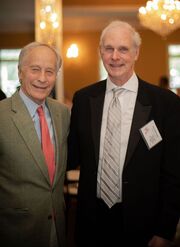Introduction of Rea Hederman
By Richard Ford
Lifetime achievement. That’s a little ominous in Rea’s and my demographic. I know age is just a number. But it can get to be a big number. This piece of expensive pottery ought to have tempusfugit inscribed on it.
The laudable achievement of a lifetime should be hard to sum up. It’s not just a catalog of victories, and challenges met, and years logged. A true lifetime achievement reflects an inner quality by which—through winning and losing—excellence is championed and single-mindedly pursued. But because it’s an inner quality, it’s not always easy to observe. Emerson wrote that “nature doesn’t like to be observed.” And Rea has done pretty much his best to make his personal pursuit and championing of excellence not always easy for us to make out.
I mean, even when he and I were little kids, we were in the first and second grades together, and I have no memory of him whatsoever. (I’m sure he was a star, of course.) This, by the way, was in the Jefferson Davis, racially segregated, all-white Elementary School on North Congress Street in Jackson, where Miss Eudora Welty had been a student thirty-five years before, and where the principal, Miss Louella Varnado, was rumored to have an electric paddling machine in her office. You didn’t necessarily try to stand out. That school—as you’ll all know—is the Barack H. Obama Magnet School now. Hederman and I figured if they weren’t going to rename it after one or the other of us, the President was a good enough alternative.
Of course, there is a legitimate catalog of accomplishments—of wins, and challenges, surmounted in the course of Rea’s now long life. My personal favorite is when Rea was summoned by his father to come run the Clarion-Ledger in 1970. Rea was writing freelance for Business Week and the New York Times in Brussels. But back to Mississippi he came. He already had an MBA from Virginia and a master’s from the J-School at Missouri. But before he would take over at the Clarion-Ledger--having never imagined taking over the newspaper, he elected to apprentice himself for three years by running the Canton Times in Canton, Mississippi. And only after that did he take over the Clarion-Ledger--and promptly changed it 180 degrees, revitalizing its news coverage and editorial policies, losing most of his staff and having to retrain the newsroom. But then going on to win virtually every major American journalism award there was, including both the George Polk and Robert F. Kennedy awards and eventually commissioning the investigative reporting that won the Clarion-Ledger its first and only Pulitzer Prize--for, in this case, “meritorious public service.” Rea wasn’t even forty years old. In most lives, this would be enough of “a lifetime achievement.”
In 1983, when the Clarion-Ledger and the Jackson Daily News were sold to the Gannett Corporation, Rea--and Angela--moved themselves to New York, and Rea set about to buy and become publisher of the New York Review of Books.
For those of you who don’t know the New York Review of Books--and surely there must be someone in this room who’s not a subscriber (You’ll, by the way, get a free subscription just for being here)--the Review is a semimonthly magazine of arts and culture published in a tabloid format, wherein the best writers and thinkers in the world publish essays and book reviews about significant new publications, or about current events, and sometimes just about ideas--and sometimes even publish fiction and poetry (though it’s never printed anything of mine). The Review’s tastes are wide. Its writers are given space enough to lean in. It’s a publication where intellectual and imaginative writers (including even academics!) get to meet a more general readership, as well as face off with their often-contentious colleagues and bad-tempered opponents in the world of letters, history, the arts, politics. and world affairs. In a country such as ours, where arts and culture are fragmented and underfunded, and often preyed upon and derided and lied about by venal politicians and their scurrilous media bagmen, the New York Review constitutes the gold standard of writerly integrity. When Rea bought the Review—in 1984 (heading toward forty years ago now)—the Review had been in glorious existence since 1963 and was edited by the same people who started it—Barbara Epstein and Robert Silvers—and was run and supported by a bunch of their fancy friends—Elizabeth Hardwick, Jason Epstein, A. Whitney Ellsworth, Robert Lowell, and others.
Kristina and I were around when Rea and Angela bought the Review. There are some amusing episodes from those times, which I don’t need to expand upon. But I couldn’t imagine—at that time--anything more improbable and daunting than Rea buying the New York Review of Books and setting up as its publisher. I mean, he wasn’t a New Yorker; he wasn’t a member of the literati. He came from a family of conservative, nondancing, Baptist teetotalers. He had run a newspaper—in Jackson, Mississippi. But he’d never run a magazine. Of the arts. Where Hannah Arendt and Susan Sontag and Saul Bellow were contributors. The most plausible outcome of this story was—and still is—that it simply didn’t happen. Only it did.
This story, all by itself, may reveal something about any lifetime achievement. For any of us who set out—whether we do it knowingly or not—to save our lives by trying to do something extraordinary with our lives, there almost has to come a moment of facing what would seem to be dead-stop impossibility . . . but somehow doing it anyway. This may be the way we find out not only what we’re capable of, but also find out what we believe, and believe in.
As I said, this all took place nearly forty years ago. And it was just the beginning. A second lifetime achievement—before Rea even published a word at the New York Review of Books.
So. Fine. Everything’s in place. Bought and paid for. It’s the next almost four decades of running the Review, though, that compose the work of a rather rare art.
For novelists—and maybe for anybody who tries and doesn’t entirely succeed at doing things as well as we’d like to—there comes a moment when you have to bump up your game. You may not even know you’re doing it, or precisely what it is you’re drawing upon in yourself. If you do better, it may just feel like luck. And partly be luck. (We all need luck.) Or, it may feel like turning around and thinking, “Gee, look what I found!”
But for whatever we want to call it, for these next thirty-seven years, Rea has owned and published the New York Review of Books and managed to maintain its gold-standard status as the English language’s, and the world’s, premier publication of arts and culture. But also, to make it better, wider, more inclusive, more useful to its readers. And he’s done it in a way that’s consistent with the little boy I don’t quite remember in Miss Garret’s second-grade class in the Barack Obama School in Jackson, circa 1951.
Which is to say: he’s stayed willingly out of the limelight so others can seem to shine. He’s kept his mitts and his predilections off the editorial side of things and quietly made the Review better from within. In an era of celebrity-owners and reality-tv buffoons, we can all agree that that’s not much how it’s done nowadays. Some of us, for our own selfish reasons, might even have wished he would’ve weighed in once in a while. Though it was “gratifying,” I suppose, to be at least a witness to acts so seemingly high-mindedly restrained and virtuous. Rea and I grew up in Mississippi—privileged little white boys—at a time when the moral world was turned upside down—by racial inequality and injustice and violence and moral absurdity. The truth was a lie, and a lie was the truth. Rea and I first became good friends in our high school “Problems in Democracy” class, where we spent a semester trying to corkscrew out how the Civil War wasn’t actually about slavery. But about “economics.” Although not about the economics of treating human beings as chattel. There was a problem in democracy, if there ever was one. And whether we exactly knew it or not—back in 1962—we were being thoroughly exposed to what bad was. And you can make an argument that if you can identify bad, you have at least a chance to identify good, and to strive for better.
Rea’s version of better—and we all of us work in our own little vineyards—was to stay, as I’ve said, largely out of the picture—he and Angela together—and to guarantee that the Review and its brilliant editors be allowed to continue their work without undue concern about the future of their mission, a mission Rea instinctively realized to be important and precious and good, and to be worth a life.
Along the way, also, there was Granta magazine, and Granta Books; for a nanosecond the London Review of Books. There was Angela’s indispensable imprint Little Book Room. There’s New York Review Books—a distinguished publishing enterprise dedicated to putting back into print neglected classics. Over the decades, he and Angela have turned their house on St. Luke’s Place (on the rare occasions when they could get their countless children out) into an ongoing salon of arts and politics and culture. There’ve been countless public events, colloquia, splashy parties, grand receptions—one I remember very well for Vaclav Havel on the stage at Lincoln Center in New York. There’s literally been no end to it. And it goes on. I once even stayed in Rea and Angela’s basement—a very nice basement—just briefly—while I did some last editing on a novel I was finishing. I ended up staying two months. (Or was it longer?)
It should be said: Rea has spent his life at the Review doing precisely what he wanted to do. And he was lucky. He married the right girl. He didn’t have monster children--he had great children. People trusted him. He fell heir to a cohort of once-in-a-life-time editors and colleagues. He had some dough. He has reasonably good manners. He’s very tall. For all I know, though, he might not even see his life as an achievement. He’s had a bit of fun, after all. But we do see it that way. Much of the achievement of his lifetime involves temerity, a quiet doggedness, and a willingness to take the risk of doing what he wanted to do in the way he wanted to do it. To give enough of a damn--rather than doing what others might’ve had plans for him to do; or what might’ve been easier or considered more “appropriate” for a boy and a man with his beginnings. George Will--and we all used to think of George Will as a conservative. (Hah!) But George Will wrote once that “talent is a species of vigor.” Rea has been, in his mission and his vocation, vigorous. He hasn’t been a dabbler. He’s taken the long view even when the long view wasn’t clear. He’s been all in from the start. It’s his inner quality, which I mentioned at the start and that I so admire and respect.
To get an award from your home state for how you’ve used your one and only life is a really big deal. We’re all honored that Rea’s come tonight. And we’re all so glad and proud to hand this award to you.
Proudly powered by Weebly

